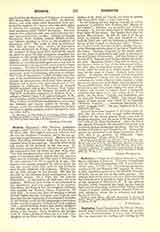

Eugendus, Saint (AUGENDUS; Fr. OYAND, OYAN), fourth Abbot of Condat (Jura), b. about 449, at Izernore, Ain, Franche-Comté; d. January 1, 510, at Condat. He was instructed in reading and writing by his father, who had become a priest, and at the age of seven was given to Sts. Romanus and Lupicinus to be educated at Condat, in the French Jura. Thenceforth he never left the monastery. He imitated the example of the above-named saints with such zeal that it was difficult to tell which of the two he resembled more. Eugendus acquired much learning, read the Greek and Latin authors, and was well versed in the Scriptures. He led a life of great austerity, but out of humility did not want to be ordained priest. Abbot Minausius made him his coadjutor, and after the former’s death (about 496) Eugendus became his successor. He always remained the humble religious that he had been before, a model for his monks by his penitence and piety, which God deigned to acknowledge by miracles. After the monastery, which St. Romanus had built of wood, was destroyed by fire, Eugendus erected another of stone, and improved the community life; thus far the brethren had lived in separate cells after the fashion of the Eastern ascetics. He built a beautiful church in honor of the holy Apostles Peter, Paul, and Andrew, and enriched it with precious relics. The order, which had been founded on the rules of the Oriental monasteries, now took on more of the active character of the Western brethren; the rule of Tarnate is thought to have served as a model. Condat began to flourish as a place of refuge for all those who suffered from the misfortunes and afflictions of those eventful times, a school of virtue and knowledge amid the surrounding darkness, an oasis in the desert. When Eugendus felt his end approaching he had his breast anointed by a priest, took leave of his brethren, and died quietly after five days.
A few years after his death, his successor, St. Viventiolus, erected a church over his tomb, to which numerous pilgrims travelled. A town was founded, which was called, after the saint, Saint-Oyand de Joux, and which retained that name as late as the sixteenth and seventeenth centuries, while its former name of Condat passed into oblivion. But when St. Claudius had, in 687, resigned his Diocese of Besancon and had died, in 696, as twelfth abbot, the number of pilgrims who visited his grave was so great that, since the thirteenth century, the name Saint-Claude came more and more into use and has today superseded the other. The feast of St. Eugendus was at first transferred to January 2; in the Dioceses of Besancon and Saint Claude it is now celebrated on January 4
GABRIEL MEIER

